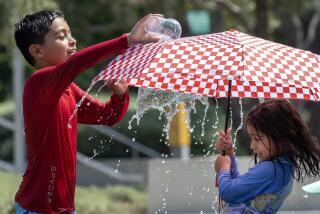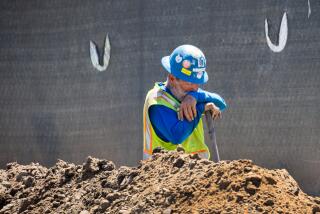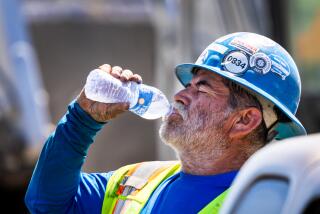Hot and Bothered
- Share via
Before the glare of fireworks fills night skies during the upcoming Fourth of July weekend, expect plenty of flashing brake lights on Southern California’s freeways.
In addition to generally clear skies and a mild wave of summer heat, forecasts call for heavy traffic and crowded beaches and parks. Even the mosquitoes will be out in force.
With Independence Day falling on a Saturday this year, stealing a three-day weekend from those unlucky enough to have to work Friday, trips to faraway holiday destinations should be less popular than usual, and Southern Californians will probably jam recreation facilities closer to home.
Sun worshipers are expected to invade Southland beaches, and most reserved campsites along the coast and in nearby foothills are already booked to capacity.
“Local traffic might be a problem,” said Jim Drago, spokesman for the California Department of Transportation.
Common bottleneck routes like Pacific Coast Highway, which recent landslides have narrowed to one lane in each direction in Malibu, are expected to add to the congestion.
Beaches and adjacent parking lots in Santa Monica and Redondo Beach probably will see the biggest mobs Saturday because of evening fireworks shows.
A warning for those headed to lakeside parks: Mosquitoes will be ready and waiting. Recent warm weather after a long, moist spring has unleased a bumper crop of the pests, especially in areas near water, according to Paul O’Connor, an ecologist with the county’s Vector Control District.
Angeles National Forest spokeswoman Randi Jorgensen said lingering patches of snow are expected to attract more visitors than the 100,000 who headed into local mountains last Fourth of July.
Easing the traffic somewhat will be the reopening of a 10-mile stretch of Angeles Crest Highway that had been closed by landslides since December.
With June gloom behind us, the weather heading into the weekend should be typically nice in the Los Angeles Basin for this time of year--sunny, but not too sunny; warm, but not too warm.
Forecasters say that there should be some fog and low clouds along the coast during the mornings but that skies should clear in the basin by noon.
High temperatures will range from the upper 60s and low 70s at the beaches to the upper 80s and low 90s in most coastal valleys. Farther inland, it will be downright sizzling, with readings of up to 100 expected in the Antelope Valley and up to 115 in the Coachella Valley.
The rainfall season, which runs from July 1 through June 30, officially ended Tuesday and, as became clear more than a month ago, downtown Los Angeles got about twice as much rain as usual--31.01 inches, compared with the average total of 14.77.
That made the El Nino-enhanced 1997-98 rainfall season the wettest since 1982-83--another El Nino year, during which 31.28 inches fell at the Civic Center--and the fourth-wettest on record.
The wettest season of all was 1883-84, when 38.18 inches of rain fell on Los Angeles after the explosion of the Krakatoa volcano in what is now Indonesia.
Times correspondent Darrell Satzman contributed to this story.
More to Read
Sign up for The Wild
We’ll help you find the best places to hike, bike and run, as well as the perfect silent spots for meditation and yoga.
You may occasionally receive promotional content from the Los Angeles Times.







